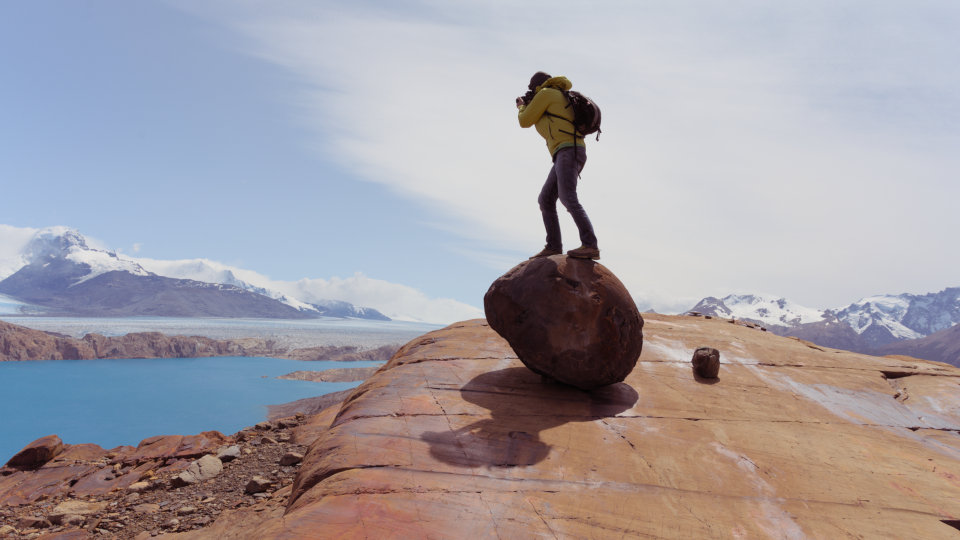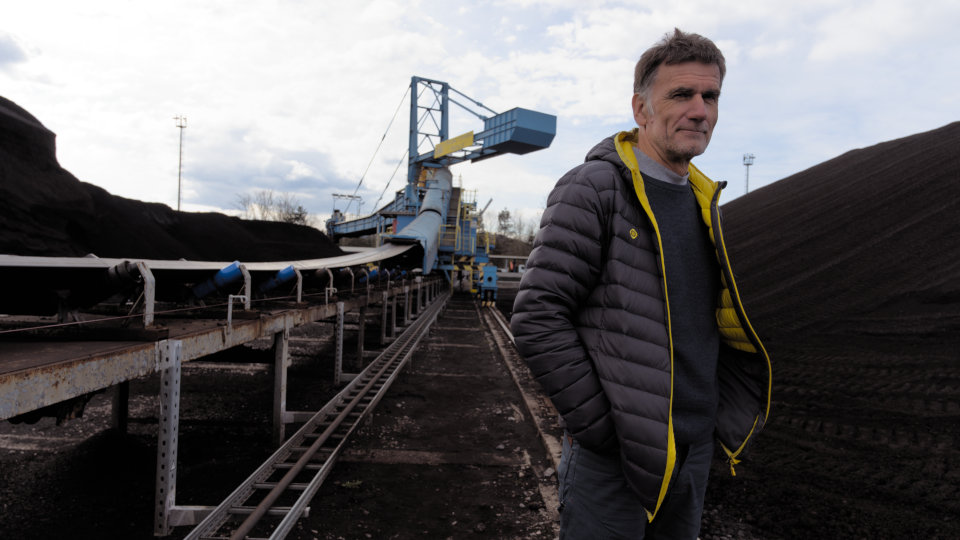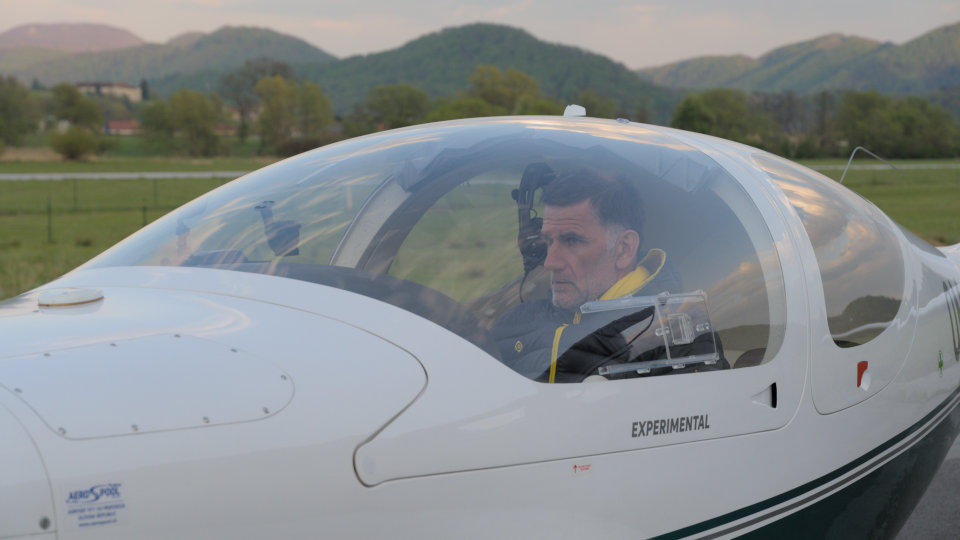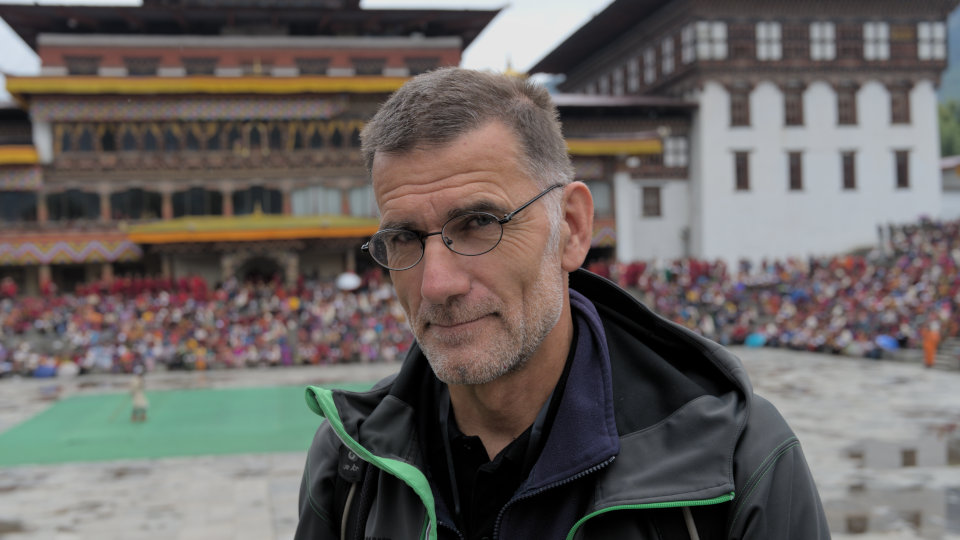



EARTH BENEATH A DARK LID
TEMNI POKROV SVETA
Matevž Lenarčič, an outstanding airman, photographer, mountaineer and environmentalist flies around the the globe with his ultralight plane and collects particles of black carbon, the second largest cause of global warming.
Matevž is a solitary adventurer who often brushes with the point-of-no-return while flying his fragile small aircraft. Matevž has already flown over the North Pole and Mt. Everest; he has landed in Antarctica; has flown non-stop over the ocean for sixteen hours and flown around the world three times. These feats have earned him the best pilot title in 2013. He used to be a paraglider before. And he still is a mountaineer. He has visited Patagonia twice, and together with a group of friends attempted to scale the mythical and for a long-time unconquered Mts. Fitz Roy and Cerro Torre. Matevž Lenarčič, Bogdan Biščak and Rado Fabjan were the first Yugoslavs who successfully climbed both mountains. Matevž has also climbed the eight-thousander, Mt. Broad Peak.
Matevž’s travels have gained a deeper meaning after he had met Griša Močnik, a physicist researching the impact of black carbon on the climate and our lives. Griša has compacted the instrument for measuring the presence of particulates in the air and thus enabled its installation in an ultralight aircraft. Matevž chooses the most vulnerable spots of our planet for his flights. With his team at the Green Light World Flight project, he creates an incredible data base allowing us to understand where these particulates linger.
Black carbon is soot. It is created when the carbon-based fuels combustion is incomplete. Large amounts of black carbon are released through the burning of biomass in wood burners, wildfires and through vehicles exhausts. Tiny black particulates remain in the atmosphere for several weeks. They enter our respiratory system, blood and even brain. Black carbon pollution causes the premature death of seven million people each year.
In Ljubljana, the Slovenian capital, numerous studies in connection with particulate emissions have been carried out, since strong winter inversions create excessive pollution with black carbon. The great majority of particulates enters the atmosphere in unventilated towns and cities due to the heating of buildings and homes using biomass and traffic emissions. Smoke from one burner with a poor combustion process can release as many particulates into the air as fifty efficient burners do and can spread to the nearby areas.
Matevž visits Sarajevo, the capital of Bosnia and Hercegovina, which is often on the list of the most polluted cities in the world. Outdated thermoelectric powerplants still operating in the Balkans create more emissions than the rest of Europe importing this environmentally unfriendly produced energy. In big cities, such as Milan, Italy, a black carbon layer heats up the city by an extra degree or two. The Alps see more incursions of desert sands, which includes soot from Africa, descends onto the glaciers and speeds up their melting. Matevž and Griša fly between the belts of sand over the Cape Verde Islands in the mid-Atlantic in order to help improve climate models.
Later, Matevž visits the south of the American Continents, Patagonia. Peter Skvarča, a glaciologist who has witnessed the break-up of the ice sheets in Antarctica, traversed the Southern Patagonian Ice Field and has been performing measurements on the glaciers for thirty years, guides Matevž over the glaciers, where the impact of climate change can be witnessed in real time.
Matevž flies the vast Pacific Ocean to reach India. Black carbon crystals absorb a lot of light, and the atmosphere over this huge country is dimmed: less sunlight reaches the ground and crop yields are smaller. The winds drive this belt of dirty air to the Himalayas where the particulates descend onto the glaciers. The intensified melt of the glaciers creates devastating floods and endangers numerous sources of drinking water over the entire subcontinent.
For Matevž, the most important stop on this journey is the Kingdom of Bhutan, a tiny Himalayan country where they perceive the Gross National Happiness (GNH) to be more important than the Gross Domestic Product as a measure of their well-being. The Bhutanese check the impact on the environment and the happiness of the inhabitants for every governmental decision and they have written their environmental commitment in their Constitution. Matevž meets the Prime Minister of Bhutan, Mr Lotay Tshering, who still volunteers as a hospital surgeon on Saturdays.
With his unusual, sometimes even extreme views on the world, Matevž Lenarčič wishes to convey the following message: We urgently need a change in our current economic order, which is environmentally and socially utterly untenable. Instead of economic growth, we need an economic degrowth and distribution of goods which is based on global equality. We have allowed ourselves to be allured by the neoliberal idea which forces us to work more to earn more and buy toys we do not need. We put pressure on the soil, abuse natural resources and pollute the environment. We are close to the tipping point, after which humanity will not be able to avert the more and more frequent catastrophic natural disasters. If we do not change our civilisation values, our planet will establish a different balance and create millions of climate, economic and war refugees. We can believe Matevž – he has experienced the Earth from a very special perspective, seen a multitude of different images and presented them through his enigmatic photographs.